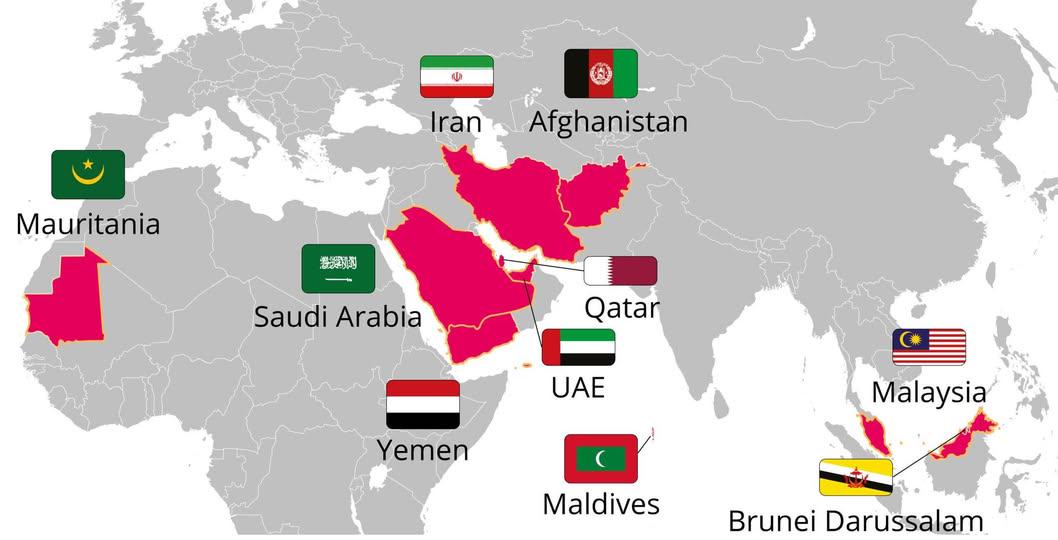Map of Countries Where Apostasy Is Punishable By Death


Marcus Rodriguez
Historical Geography Expert
Marcus Rodriguez specializes in historical cartography and geographic data analysis. With a background in both history and geography, he brings unique...
Geographic Analysis
What This Map Shows
This map illustrates a sobering reality: it highlights the ten countries where apostasy, defined as the act of leaving or renouncing a religion, is theoretically punishable by death. This visualization serves as a stark reminder of the intersection between belief systems and legal systems around the globe. It lays bare the complexities and consequences that individuals face when they choose to depart from their faith in certain regions.
Deep Dive into Apostasy and Its Implications
Apostasy is a contentious topic, often tied to deeply ingrained cultural and religious beliefs. In many societies, religion is not merely a personal choice but a foundational aspect of identity and community. Thus, leaving one's faith can be seen as a betrayal or even a threat to social order. Interestingly, while many countries have secular laws that protect freedom of belief, others maintain strict interpretations of religious laws that can lead to severe penalties, including death.
Globally, the countries where apostasy is punishable by death predominantly follow strict interpretations of Islamic law (Sharia). The legal frameworks in these countries often stem from ancient texts and are influenced by the societal norms that have evolved over centuries. For instance, nations like Iran and Saudi Arabia enforce these laws rigorously, with apostasy considered an offense against God and the state. The punishments can range from imprisonment to execution, depending on the circumstances and local judicial interpretations.
Statistically, according to reports from organizations like Amnesty International, the number of executions for apostasy is difficult to ascertain due to the secretive nature of such proceedings. However, it is known that in some cases, individuals have been sentenced to death but have not faced execution due to international pressure or diplomatic interventions.
Interestingly, even within these countries, public attitudes towards apostasy can vary significantly. Some citizens may harbor more progressive views, advocating for religious freedom and tolerance, while others may staunchly support traditional interpretations of religious law. This divergence often leads to internal conflicts and debates about human rights versus religious obligations.
Regional Analysis
Breaking down the map by region offers deeper insights into the cultural and legal landscapes surrounding apostasy. In the Middle East, countries like Iran and Saudi Arabia are notable for their harsh penalties. In Iran, the legal system is heavily influenced by Shia Islam, whereas Saudi Arabia, governed by Wahhabism, strictly enforces Sharia law. These nations set a precedent for how religious laws can overshadow individual freedoms.
Conversely, in regions like North Africa, while certain countries like Sudan have similar laws, the enforcement may not be as stringent as in the Gulf states. For example, in Sudan, apostasy laws have faced criticism and calls for reform, reflecting broader societal changes.
In contrast, countries like Afghanistan present a unique case, especially in light of the recent political changes. The Taliban's return to power has reignited fears regarding the enforcement of apostasy laws, suggesting a potential resurgence of extreme punitive measures against those who abandon Islam.
Significance and Impact
The implications of apostasy laws extend beyond the individual to affect entire societies. They raise critical questions about human rights, freedom of expression, and the role of religion in governance. In recent years, there has been a growing international movement advocating for religious freedoms, pushing back against these draconian laws. Organizations are working tirelessly to highlight cases of individuals facing persecution for their beliefs, fostering dialogue about the need for reform.
Moreover, the global community's response can shape the future of religious tolerance. With increasing globalization, the clash between traditional beliefs and modern human rights standards continues to evolve. It’s important to note that these laws not only affect those who wish to leave their faith but also create an environment of fear and repression that stifles open dialogue about religion.
As countries grapple with these issues, the future remains uncertain. Will we see a shift towards greater acceptance and protection for individual beliefs, or will traditional laws continue to dominate? Only time will tell, but what is clear is that the conversation around apostasy is becoming increasingly relevant in our interconnected world.
Visualization Details
- Published
- October 17, 2025
- Views
- 48
Comments
Loading comments...